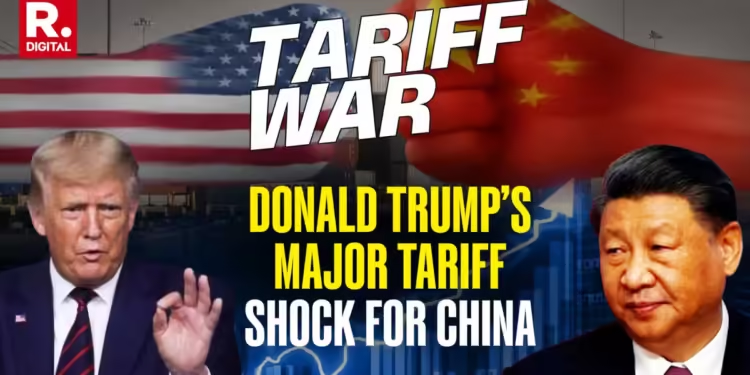Trump’s steep global tariffs, including 104% on China, shake markets, raise prices, and trigger fears of a major global trade war.
Major Economic Shift:
Donald Trump rocked the world economy by imposing a fresh round of tariffs on April 7, 2025. The most striking was a hefty 104% levy on items from China. This action is a component of Trump’s strategy to impose “reciprocal” tariffs on dozens of nations. International relations, trade routes, and stock markets are already seeing significant reactions as a result of these levies.
What Are Tariffs?
A tariff is a tax placed on goods imported from other countries. Governments use tariffs to make foreign products more expensive, hoping that people will buy more local products instead. But high tariffs can also lead to trade wars, where countries hit each other’s goods with more taxes, making things worse for businesses and consumers.
What Is Trump Doing?
Trump has raised import taxes on many countries. But the biggest hit is for China. Just last week, the U.S. had 54% duties on Chinese goods. Now, they have nearly doubled to 104%. These taxes came into effect at 12:01 a.m. Eastern Time and they apply to a wide range of products imported into the U.S.
Trump Raise the Tariffs:
Trump says these tariffs are “reciprocal,” meaning he believes other countries, especially China, charge American products high taxes, so he is doing the same in return. He claims the goal is to protect American jobs and industries and to force other countries to negotiate fairer trade deals with the U.S.
China’s Reaction:
“We will fight until the very end.” This was not taken lightly in China. China announced counter-tariffs on U.S. imports just last week. Since Trump responded by imposing even more levies, China has pledged to “fight to the end.” They claim that these acts are detrimental to the stability of international trade and amount to economic blackmail. The stock market suffers. Global financial markets reacted swiftly and adversely. Since the tariffs were first announced by Trump:
- The S&P 500 fell below 5,000 for the first time in almost a year.
- U.S. companies lost about $5.8 trillion in stock market value.
- Japan’s Nikkei index dropped by over 3%.
- South Korea’s currency, the won, fell to a 16-year low.
- Asian markets from Australia to Taiwan saw major losses.
Experts say this level of market reaction shows that investors are deeply worried about how far this trade war could go.
What’s Happening in China’s Markets?
China is feeling the heat too. In cities like Yiwu, home to one of the world’s largest wholesale markets, businesses are struggling. Many rely on exports to the U.S. With a 104% tariff, their products become far too expensive for American buyers. Chinese exporters fear their goods will just sit in warehouses with no one to buy them.
Global Trade War:
It certainly looks like it. When big economies like the U.S. and China start charging each other high tariffs, it does not just affect them, it affects the entire world. Other countries are caught in the middle, unsure of whom to support. Trade routes are disrupted, and global businesses lose confidence.
Tariffs Permanent:
This is where things get confusing. Trump said these tariffs are “permanent,” but at the same time, he told reporters that many countries now want to negotiate. According to him, the pressure from these tariffs is working and forcing world leaders to talk about trade deals. However, nothing is confirmed yet.
Trump’s Message:
Tariffs Bring Power. Trump believes tariffs give the U.S. power in global discussions. Speaking at the White House, he said, “We have a lot of countries coming in that want to make deals.” He mentioned that even China might want to agree to a new deal under this pressure. If you are wondering how all this affects everyday life, here’s a breakdown:
- Prices may go up in the U.S., especially for Chinese-made goods like electronics, clothes, and toys.
- Small businesses in both the U.S. and China may struggle.
- People may lose jobs if companies can’t sell or afford goods.
- Global shipping costs may rise due to new trade barriers.
So, even if you are not in politics or finance, these changes could still impact your wallet.
Led to a Recession:
Some economists fear that a deep trade war could hurt the global economy so much that it leads to a recession, a time when economic activity slows down, people lose jobs, and companies make less money. The fall in stock prices and investor panic are early warning signs.
Any Hope for a Deal:
It is possible. Trump says he wants countries to come forward and talk. If the U.S. and China agree to new trade rules, the tariffs could be reduced or removed. But reaching such a deal will be hard, especially if both sides continue to argue without compromise.
Other Countries Reacting:
While China is the biggest target, Trump’s tariffs also hit dozens of other countries. Some of these countries are:
- European nations that export cars, machinery, and food to the U.S.
- India, which sells textiles and software.
- Mexico and Canada are the U.S.’s closest trade partners.
These countries are now deciding how to respond. Some might add tariffs of their own. Others may try to talk it out.
Final Thoughts:
It is a risky move for Trump to impose broad international tariffs, particularly the 104% levy on Chinese imports. Although he wants to demonstrate American power and secure better trade agreements, the early indications point to significant harm to global relations and markets. One thing is certain as nations react and the world awaits talks: a new era of international commerce is dawning, and it is rife with uncertainty. What transpires in the upcoming weeks will determine whether this results in more equitable agreements or more serious economic issues.























